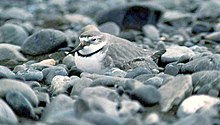| Wrybill | |
|---|---|

| |
| Wrybill sitting on eggs | |
| Scientific classification | |
| Domain: | Eukaryota |
| Kingdom: | Animalia |
| Phylum: | Chordata |
| Class: | Aves |
| Order: | Charadriiformes |
| Family: | Charadriidae |
| Genus: | Anarhynchus |
| Species: | A. frontalis
|
| Binomial name | |
| Anarhynchus frontalis | |
The wrybill or (in Māori) ngutuparore (Anarhynchus frontalis) is a species of plover endemic to New Zealand.[2] It is the only species of bird in the world with a beak that is bent sideways in one direction, always to the right (in the crossbills, e.g. Loxia pytyopsittacus, the tips of the upper and lower mandibles cross because they are bent sideways in opposite directions, sometimes left over right and sometimes right over left). A 2015 study found it to be within the Charadrius clade, with other New Zealand plovers its closest relatives; the nearest being the New Zealand dotterel or New Zealand plover (Charadrius obscurus), and then the double-banded plover or banded dotterel (Charadrius bicinctus).[3]
It lays its eggs among the rocks along rivers and distracts intruders by pretending to be in distress and moving away from its clutch.
It is rated as vulnerable on the International Union for Conservation of Nature (IUCN)'s Red List of Threatened Species.
- ^ BirdLife International (2018). "Anarhynchus frontalis". IUCN Red List of Threatened Species. 2018: e.T22693928A131876706. doi:10.2305/IUCN.UK.2018-2.RLTS.T22693928A131876706.en. Retrieved 12 November 2021.
- ^ Barrie Heather and Hugh Robertson, "The Field Guide to the Birds of New Zealand"(revised edition), Viking, 2005
- ^ dos Remedios, Natalie; et al. (2015). "North or south? Phylogenetic and biogeographic origins of a globally distributed avian clade" (PDF). Phylogenetics and Evolution. 89: 151–159. Bibcode:2015MolPE..89..151D. doi:10.1016/j.ympev.2015.04.010. PMID 25916188.
